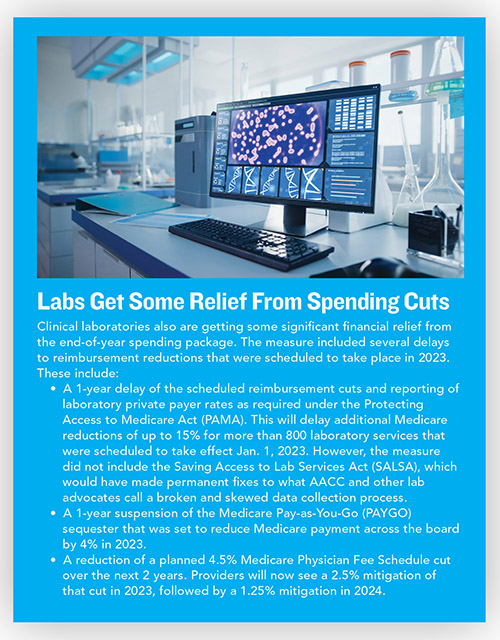
Clinical laboratories are breathing a sigh of relief after Congress failed to pass legislation that would have given the Food and Drug Administration (FDA) clear oversight authority over lab-developed tests (LDTs).
The Verifying Accurate, Leading-Edge IVCT Development (VALID) Act would have created a risk-based framework for regulating LDTs. The legislation was originally going to be included in the federal spending package passed by lawmakers at the end of 2022, but Rep. Cathy McMorris Rodger (R-Wash.) successfully blocked its inclusion after an intense lobbying campaign by AACC and others.
On the Senate side, Rand Paul noted that the bill would have compounded problems FDA faced during the pandemic. “For decades we have allowed clinical labs in our nation’s academic medical centers the freedom to innovate under the CLIA. The VALID Act would have upended that system and replicated the testing nightmare of the early days of the COVID pandemic, putting all lab-developed tests under the FDA’s control. I have been fighting to stop the VALID Act for years, so I am pleased to say that despite a major push all year by powerful special interests, the VALID Act was kept out of the 2022 year-end legislation.”
AACC has long maintained that LDTs already are regulated under the Clinical Laboratory Improvement Amendments of 1982 (CLIA). All LDTs are classified as high-complexity tests, and labs performing them must comply with rigorous quality control, proficiency testing, and personnel requirements and must demonstrate the test’s analytical validity. Although CLIA does not require labs to establish clinical validity, the major private sector accrediting organizations, such as the College of American Pathologists and the Joint Commission, do require that labs document clinical validation.
To persuade lawmakers, AACC members wrote some 1,600 emails to their representatives on Capitol Hill, and AACC leaders and members participated in more than 30 face-to-face and virtual visits with lawmakers in 2022 on LDTs. The association also raised awareness through social media campaigns, interviews with the media, and paid announcements in news outlets targeted to Congress.
More than 100 healthcare and patient advocacy groups, including AACC, signed on to a letter to key lawmakers in May 2022, arguing that the legislation would be too burdensome and would erect significant barriers for labs with LDTs. “The VALID framework would be costly as laboratories would be subject to user fees and need to finance the internal FDA compliance activities that would be required,” the letter read. “This would force many laboratories, especially community laboratories, to consolidate their testing menu, which would disrupt localized patient care and minimize the innovative efforts at our most prestigious institutions.”
Jon Harol, president of Lighthouse Lab Services, a consulting company based in Charlotte, North Carolina, says that while VALID was well intentioned, had it passed it would have stifled innovation in the clinical lab testing space while at the same time adding a layer of expense and bureaucracy to the process.
“VALID would have resulted in significant delays in new life-saving testing getting to patients while creating a marketplace that only the largest 1 percent of labs could compete in,” Harol said. “Concerns about the safety and effectiveness of LDTs has been overblown in my opinion, in part because of Theranos and in part because of some inaccurate COVID tests early in the pandemic, which led to the public raising concerns about bad tests. It’s more of a public relations problem than a real problem. VALID was a hammer in search of a nail. In general, having a medical director who oversees LDTs is sufficient to ensure the safety and effectiveness of LDTs.”
Patricia Jones, PhD, DABCC, FADLM, clinical director of the chemistry and metabolic disease lab at Children’s Medical Center of Dallas and past president of AACC, said she is relieved that Congress did not pass the VALID Act, although she believes the FDA may continue seeking ways to regulate LDTs.
“We can take a deep breath for now, but I don’t think the FDA is going to give up wanting to regulate LDTs. This won’t be our last battle.”
Children’s Medical Center has developed more than 20 LDTs, many of which are used to diagnose rare conditions in children. LDTs at Children’s are developed because there are not already FDA-approved tests available to test for certain unusual illnesses, or to provide rapid drug results to allow clinicians to make timely interventions for good patient care, Jones noted. Tests used in her lab include assays to diagnose rare genetic abnormalities, along with tests for therapeutic drugs, toxicology screening, monitoring genetic disorders, and diagnosing cancer. Children’s likely would have stopped performing many of these tests if the VALID Act had become law, she said.
THE FIGHT CONTINUES
Just because the VALID Act was not included in the spending package doesn’t mean the pressure is permanently off the lab community, said Jones, who believes laboratory groups need to continue educating legislators on Capitol Hill about what LDTs are and why they are so important. “I think the next step is to push for modernization of CLIA,” she said.
Harol agreed, noting that the best approach to ensuring effective oversight of LDTs is to update CLIA. Harol ran a poll on LinkedIn in early January 2023 asking whether people feel that the current CLIA regulations are adequate to address the issues modern labs are facing, such as algorithm-based tests. As of mid-January, 81% of respondents said the CLIA regulations need to be updated, 11% said the current regulations are good, and 8% said they were unsure.
“Rarely do you see an industry saying it wants more regulation, but the CLIA regulations are outdated and need additional clarification,” Harol said.
In a position statement issued in December 2021, AACC argues that CLIA, under the Centers for Medicare and Medicaid Services (CMS), should remain the primary mechanism for overseeing all laboratory tests. Among other recommendations on LDTs, AACC suggests CLIA be updated to require laboratories to demonstrate clinical validity for LDTs and that CMS update its interpretive guidelines to help ensure LDT quality.
EXPECT A TARGETED APPROACH FROM FDA
James Boiani, an attorney with Epstein Becker and Green in Washington, D.C., believes FDA will continue to deal with LDTs of concern through a targeted approach, such as by sending letters to test developers—much as it has done in the past.
“FDA has been chipping away at the LDT exception on a case-by-case basis for years,” Boiani said. “There haven’t been major legal challenges to that approach. Personally, I don’t like it because it leads to unpredictable ‘regulation by warning letter.’”
FDA has argued in recent years that the dramatic increase in and complexity of LDTs, particularly in the field of genetic testing, necessitates that some LDTs be cleared or approved by FDA. In 2010, the agency announced its intent to reconsider its policy of enforcement discretion for LDTs and held a workshop to obtain input from stakeholders. This led to a 2014 draft approach for LDT oversight, followed by a 2017 discussion paper in which FDA said that “LDTs have evolved and proliferated significantly since FDA first obtained comprehensive authority to regulate all in vitro diagnostics as devices in 1976. Some LDTs are now much more complex, have a nationwide reach, and present higher risks, such as detection of risk for breast cancer and Alzheimer’s disease, which are similar to those of other IVDs that have undergone premarket review.”
In 2018, FDA officials issued a general warning about genetic tests that claim to predict patients’ responses to specific medications. In 2019, FDA issued a warning letter to Inova Genomics Laboratory for illegally marketing three tests that had not been reviewed by the agency for safety and effectiveness. The tests claimed to predict patients’ responses to specific medications based on genetic variants. In issuing the letter, FDA said it was asserting its enforcement discretion to regulate LDTs. In response to the letter, Inova stopped performing its suite of pharmacogenomic tests.
While FDA may continue targeted enforcement, ultimately, how LDTs are handled might come down to payers, Boiani said. “What might happen in the absence of the VALID Act is payers imposing different requirements on data they need to see before they reimburse tests,” he said. “If the test isn’t being billed, maybe it’s less of an issue, but if it is being billed, you are going to have an arcane patchwork of different payers and different states with different requirements. That could be the headwind that labs are facing.”

Kimberly Scott is a freelance writer who lives in Lewes, Delaware. +Email: [email protected]